A Quote by John Lewis
The advent of the civil rights movement during the 50s and 60s made it very plain crystal clear to me that we had an obligation to do what we could to make real the Constitution of the United States of America.
Related Quotes
You can't separate the phenomenal birth of unionism in the United States of America from the Pullman porters. This same small group of men, who grew to be 10,000 strong, was also the organizational foundation for the civil rights movement and all of the gains that were made in the '40s and the '50s. That, and the black church.
The Constitution makes very clear what the obligation of the United States Senate is and what the obligation of the president of the United States is. To allow a Supreme Court position to remain vacant for well over a year cuts against what I think the intentions of the framers are and what the traditions of the Senate and the executive are.
I was involved in the civil rights movement way back in the late '50s and through the '60s and '70s. I was doing a civil rights musical here in Los Angeles and we sang at one of the rallies where Dr. Martin Luther King spoke, and I remember the thrill I felt when we were introduced to him. To have him shake your hand was an absolutely unforgettable experience. Even before I could vote, I was involved in the political arena.
Yes, it is hard out there. But hard is relative. I come from a middle-class family, my parents are academics. I was born after the Civil Rights movement, I was a toddler during the women's movement, I live in the United States of America, all of which means I am allowed to own my freedom, my rights, my voice and my uterus.
Before the formation of this Constitution it had been affirmed as a self evident truth, in the Declaration of Independence, very deliberately made by the Representatives of the United States of America in Congress assembled that 'all men are created equal, and are endowed by their Creator with certain unalienable rights' This declaration of Independence was received and ratified by all the States in the Union & has never been disannuled. May we not from hence conclude, that the doctrine of Liberty and Equality is an article in the political creed of the United States.
When I began writing poems, it was in the late 60s and early 70s when the literary and cultural atmosphere was very much affected by what was going on in the world, which was, in succession, the civil rights movement, the antiwar movement, and the women's movement in the 60s, 70s, and into the early 80s. And all of those things affected me and affected my thinking, particularly the Vietnam War.
I would not have suffered my name to have been used by my friends on anywise as President of the United States, or candidate for that office, if I and my friends could have had the privilege of enjoying our religious and civil rights as American citizens, even those rights which the Constitution guarantees unto all her citizens alike.
Jim Jones started out as a civil rights crusader in Indianapolis. As a young preacher in the mid-50s, he used members of his congregation to integrate lunch counters and all-white churches in rich neighborhoods; they'd just march in and sit down at the pews and see what happened. Often they were received with racist insults, and once with a bomb threat. But the fact that you had this charismatic, white man, aggressively promoting racial equality, was a huge draw for African Americans, many of whom felt the Civil Rights Movement had stalled by the late 60s.
What is the appeal of Trump, really? It's nostalgic: "Make America great again." Like European nationalists, he has a vision of a "real" America, one which predates globalization, immigration, feminism, the civil rights movement and technological change, an imaginary 1950s to which we can now return. That is actually not very different from the kind of language that Marine Le Pen uses, or parts of the Brexit movement.

































